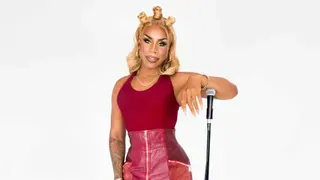May 24, 2024
EDGE Interview: See What Happens When Julio Torres Loses an Earring on HBO's 'Fantasmas'
Kilian Melloy READ TIME: 8 MIN.

Source: HBO
EDGE: There's a lot of queer representation in these six episodes. You've said in the past that you didn't necessarily want to be a spokesperson for any particular group, but the representation is front and center here.
Julio Torres: It's not that I reject that idea. I don't, but it's more like I feel daunted by the conceit that I would be elected to speak on behalf of anyone. But I think that the representation that you see here is very honest. I made a show about the people who interest me, with friends of mine, and this is what it looks like. It's not formulaic, it's not aimed to check any boxes or please [any particular group].
I think these things come about organically when different kinds of people are granted the opportunity to make work, because then it's like they bring in their world. And this one's mine.
EDGE: I've heard it said that writers and directors who are immigrants to America have a clearer view of American society that people who grew up here might not have. Do you think that's true?
Julio Torres: I think that's an interesting thesis. I don't know if I necessarily agree with it. Here's what I'll say: I think that being in some way a little bit othered, in ways that don't necessarily go hand-in-hand with nationality, allows you a better glimpse of the inside [of how society works]. Spike Lee, for example, who I think is one of the greatest American directors of our time, is very American, but he has a way of looking at how people move, and societies, and commenting on them in a way that is very warm, very welcoming, and very celebratory. So, I think it's more of a question of empathy and curiosity. But given that what I am commenting on is bureaucracy and feeling othered, I do think that for those specific purposes my alien status does allow me to maybe see these things in this way.

EDGE: There's also the more universal question that you dive into of human existence itself. Is that something that's always in the back of your mind, or did you feel this was a theme that you had to address given the social and political things you're talking about in the show?
Julio Torres: I'm fascinated by the things that people need in order to function in a society, especially a society like New York. As someone who didn't always have all the things, I think I'm very sensitive to when spaces are not made available for everyone. Like, for example, the fact that now in the subways here in New York, you have [to have] your credit card or your phone to enter. Now, you can still buy a metro card in the more conventional way, but you have the feeling that they may be phasing out, which means that in a not-so-distant future maybe only people that have a bank will be able to move in New York. I think a lot of people don't think twice about that, because it's a given for them. But there's a tyranny to phasing out those who don't exist in those systems.
EDGE: Your costar in "Problemista" is Tilda Swinton, and in "Fantasmas" you have all sorts of surprising guest stars. Are these people you wrote for specifically, or did you cast out a net and say, "Hey, come play in my sandbox," and see who showed up?
Julio Torres: It was an open invitation to come to the sandbox, and these are the people who showed up. I love writing for actors, but I don't write for people I don't know, because I feel like that could be a dangerous game to play where you end up not getting that person, and then you end up seeing whomever you did cast as a consolation prize or something. So, I don't do that; I write for friends who I know will do it. Like, the character of Vanesja was my friend Martine from the very beginning. I adore her, and I want to work with her for the rest of my life. And then Tilda's schedule was one that, sadly, we couldn't have her come to New York to physically do something, but I was like, "Okay, do you want to be the voice of the water?" And she's like, "Yes, yes, absolutely!" And then I tailored that to fit her.
It's fun. I feel kinda like a tailor or seamstress, making garments for other people that want to wear them.
"Fantasmas" premieres June 7 on HBO.
Kilian Melloy serves as EDGE Media Network's Associate Arts Editor and Staff Contributor. His professional memberships include the National Lesbian & Gay Journalists Association, the Boston Online Film Critics Association, The Gay and Lesbian Entertainment Critics Association, and the Boston Theater Critics Association's Elliot Norton Awards Committee.







